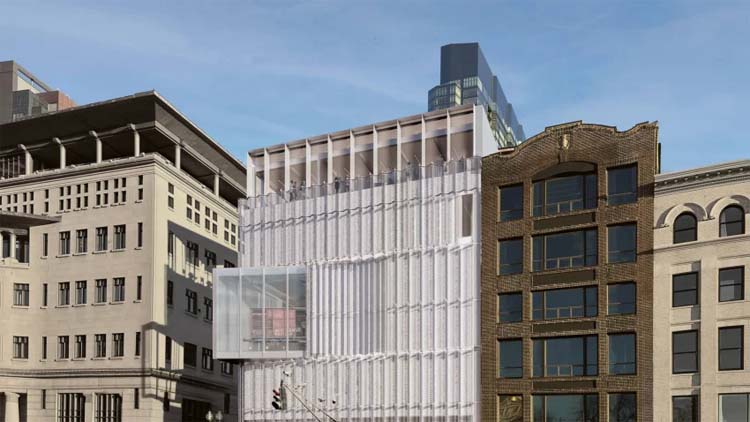By Sophia Pargas and William Reed
Published June 5, 2023 Updated on June 15, 2023 at 4:24 pm
The six-story museum is scheduled to open along Boston’s Freedom Trail in early 2026

For the first time through recently released renderings, residents can catch a glimpse of the Boston Holocaust Museum and Education Center which is scheduled to open in early 2026. Located on Boston’s historic Freedom Trail, the proposed six-story, 33,000 square-foot, stainless steel museum would serve as a reminder of the horrors of The Holocaust and a warning against antisemitic ideologies.
The architecture of the building is designed to replicate the realities experienced by Jewish people during The Holocaust, according to the Holocaust Legacy Foundation, the organization behind the museum. The enduring, sturdy materials of the building are meant to represent the metal fences that surrounded the concentration camps that kept Jewish people enslaved. Another main feature of the building is a stainless-steel woven metal fabric that wraps the building’s mid-level floors, meant to illustrate the drawn curtains in Jewish households at the time of Nazi rule.
Behind this metal curtain, an authentic railcar that was used to deport Jews to the death camps of The Third Reich will be displayed. Through a modern bay window, passersby on the Freedom Trail will be able to see museum visitors going into the railcar but not leaving it, which serves to remind viewers of the reality of millions of people who were transported to their internment or eventual death.
“From the street, spectators will witness the history of the Holocaust in the moment that freedom is lost,” said Foundation co-founder Jody Kipnis, who had the idea to expose the rail car when the Foundation was informed of the acquisition.
“This will serve as a powerful reminder of the dangers of allowing prejudice and hatred to go unchallenged,” co-founder Todd Ruderman added.
The proposed design is by Boston architecture firm Schwartz/Silver Architects Inc. The Foundation has filed the plans with the city’s Planning and Development Agency (BPDA).
